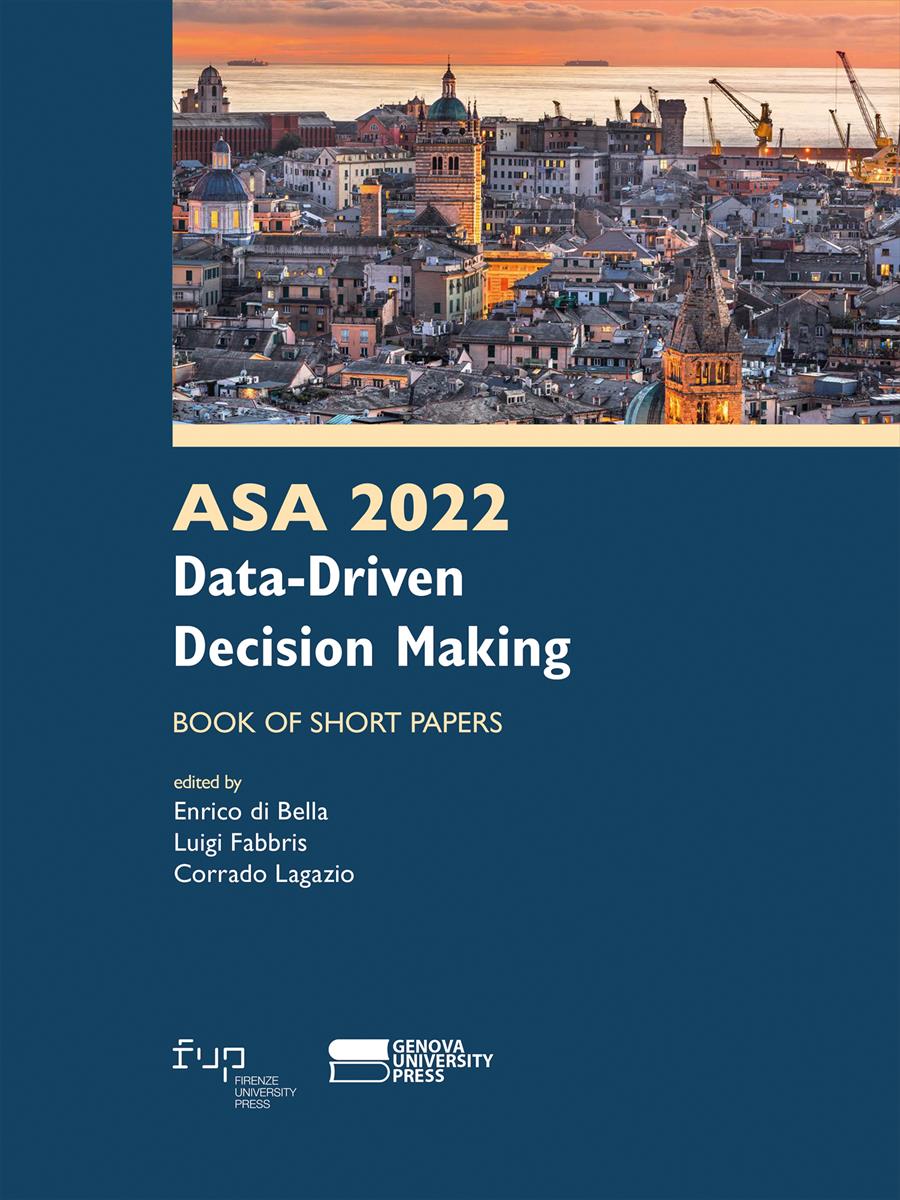- ASA 2022 Data-Driven Decision Making
- Edited by Enrico di Bella, Luigi Fabbris, Corrado Lagazio
The impact of economic insecurity on life satisfaction among German citizens
- Demetrio Panarello
- Gennaro Punzo
- © 2023 Author(s) |
- CC BY 4.0
- DOI: 10.36253/979-12-215-0106-3.11
The concept of life satisfaction dates back to the Age of Enlightenment and became popular in the Nineteenth century as a synonym for ‘good life’. Efforts are still underway to overcome the traditional economic criteria of well-being by broadening the definition and measurement of life satisfaction based on a large set of indicators. Although ‘money cannot buy happiness’, the economic dimension remains a crucial element of life satisfaction. Economic insecurity arises from unpredictable economic losses, which may affect individuals’ well-being due to the feeling of failure and inability to recover. In this paper, economic insecurity is investigated for its impact on the trajectories of life satisfaction over a timespan of 30 years among working-age German citizens, grouped by age (16-29, 30-39, 40-49, 50-64) and activity sector (secondary vs. tertiary). Latent Growth Curve Models were estimated on longitudinal data from the German Socio-Economic Panel (SOEP), using individual and time fixed effects. The analyses allow us to break down the impact of economic insecurity on life satisfaction into a fixed component and a specific random component for each individual. Every year, panel respondents have been asked to provide their subjective perception of life satisfaction on a 10-point Likert scale. Economic insecurity is measured through the Bossert and D’Ambrosio’s index. Our results show that economic insecurity has a negative impact on life satisfaction, which becomes more relevant for people in the 40-49 age group. This impact appears to be stronger for workers belonging to the secondary sector. Moreover, among the youngest individuals (16-29), such an impact shows a higher variability over time: therefore, within this age group, economic insecurity appears to affect life satisfaction more unpredictably. As relevant differences exist between the considered groups, our results give way to the implementation of targeted policy measures.
- Keywords:
- SOEP,
- Well-being,
- Panel data analysis,
- Latent Growth Curve Models,
University of Bologna, Italy - ORCID: 0000-0003-1667-1936
University of Naples Parthenope, Italy - ORCID: 0000-0001-6861-9553
- Bossert, W., Clark, A., D’Ambrosio, C., Lepinteur, A. (2019). Economic Insecurity and the Rise of the Right. CEP Discussion Papers 1659.
- Bossert, W., D’Ambrosio, C. (2016). Economic insecurity and variations in resources. ECINEQ Working Paper 422.
- Colantone, I., Stanig, P. (2018). The trade origins of economic nationalism: Import competition and voting behavior in Western Europe. American Journal of Political Science, 62(4), pp. 936-953.
- D'Ambrosio, C., Rohde, N. (2014). The Distribution of Economic Insecurity: Italy and the U.S. over the Great Recession. Review of Income and Wealth, 60, pp. S33-S52.
- Giambona, F., Grassini, L., Vignoli, D. (2022). Detecting economic insecurity in Italy: a latent transition modelling approach. Statistical Methods & Applications, 31, pp. 815-846.
- Guiso, L., Herrera, H., Morelli, M., Sonno, T. (2017). Demand and Supply of Populism. London, UK: Centre for Economic Policy Research.
- Hall, J., Giovannini, E., Morrone, A., Ranuzzi, G. (2010). A Framework to Measure the Progress of Societies. OECD Statistics Working Papers 2010/05.
- Hasan, H. (2019). Confidence in Subjective Evaluation of Human Well-Being in Sen’s Capabilities Perspetive. Journal of Happiness Studies, 20, pp. 1-17.
- Linz, S.J., Semykina, A. (2010). Perceptions of economic insecurity: Evidence from Russia. Economic Systems, 34(4), pp. 357-385.
- Panarello, D. (2021). Economic insecurity, conservatism, and the crisis of environmentalism: 30 years of evidence. Socio-Economic Planning Sciences, 73: 100925.
- Rohde, N., Tang, K.K., Osberg, L., Rao, P. (2016). The effect of economic insecurity on mental health: Recent evidence from Australian panel data. Social Science & Medicine, 151, pp. 250-258.
- Smith, T.G., Stillman, S., Craig, S. (2013). The U.S. Obesity Epidemic: New Evidence from the Economic Security Index. Annual Meeting of the Agricultural and Applied Economics Association Paper 151419.
- Veenhoven, R. (2017). Greater happiness for a greater number: Did the promise of enlightenment come true?. Social Indicators Research, 130(1), pp. 9-25.
Chapter Information
Chapter Title
The impact of economic insecurity on life satisfaction among German citizens
Authors
Demetrio Panarello, Gennaro Punzo
Language
English
DOI
10.36253/979-12-215-0106-3.11
Peer Reviewed
Publication Year
2023
Copyright Information
© 2023 Author(s)
Content License
Metadata License
Bibliographic Information
Book Title
ASA 2022 Data-Driven Decision Making
Book Subtitle
Book of short papers
Editors
Enrico di Bella, Luigi Fabbris, Corrado Lagazio
Peer Reviewed
Publication Year
2023
Copyright Information
© 2023 Author(s)
Content License
Metadata License
Publisher Name
Firenze University Press, Genova University Press
DOI
10.36253/979-12-215-0106-3
eISBN (pdf)
979-12-215-0106-3
eISBN (xml)
979-12-215-0107-0
Series Title
Proceedings e report
Series ISSN
2704-601X
Series E-ISSN
2704-5846
